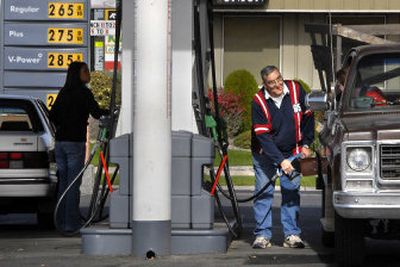Spokane gas prices highest in lower 48

Prices at the pump are falling, but Spokane motorists are still paying dearly for a gallon of gas.
As of Tuesday, Spokane was tied with Anchorage for having the second-highest gas prices among more than a hundred large metropolitan areas throughout the country, according to a consumer Web site, GasBuddy.com.
The average price for a gallon of regular unleaded in Spokane clocked in at $2.65. Only Honolulu’s gas prices were higher, at $2.87.
Coeur d’Alene isn’t listed on GasBuddy’s metropolitan ranking, but according to the American Automobile Association’s Daily Fuel Gauge Report, prices there averaged $2.47 a gallon Tuesday, about 20 cents higher than the national average of $2.26 a gallon.
Spokane’s price is almost 40 cents higher than the national average and far higher than gas costs in the cheapest city – Des Moines, Iowa, at $1.96 a gallon, according to GasBuddy.com.
Washington, which has the sixth-highest gas tax in the nation, ranked fifth among states for most-costly gas, GasBuddy said. Idaho ranked No. 7.
Tim Hamilton, executive director of the Olympia-based Automotive United Trades Association, accuses ExxonMobil Corp., Conoco-Phillips Inc. and other oil giants of limiting production at refineries that serve our region, in Salt Lake City and Billings. By refusing to add production, he said, there’s never enough gas to fill the needs of the rapidly growing region, causing prices to rise.
Hamilton, whose nonprofit trade group represents gasoline retailers, said he’s been inundated with questions from political groups and the media about whether corporations have decreased gas prices nationally to help Republican candidates retain seats in the upcoming election.
“There are some phenomenal coincidences that make people very suspicious. Either that or you could argue that they (oil companies) raised prices up without fear of retaliation,” said Hamilton, who regularly testifies before state and national lawmakers.
A recent Gallup poll found that nearly half of all Americans believe gas prices are being influenced by the November elections. That finding was met with derision by White House spokesman Tony Snow, who told reporters several weeks ago that the power to rig gas prices would give President Bush “the kind of magisterial clout unknown to any other human being.”Last month U.S. Sen. Maria Cantwell asked the Federal Trade Commission to investigate the disparities in gas and diesel prices between Eastern and Western Washington and the lingering high prices in Eastern Washington.
While the Washington state attorney general’s office has gotten a rash of calls about high gas prices throughout the state, a representative said they’ve found no evidence of illegal activity.
“We monitor gas prices regularly. We’re specifically looking for evidence of collusion or conspiracy – basically antitrust violations,” said Kristin Alexander, a Seattle-based spokeswoman for the attorney general’s office.
Gasoline and diesel are unregulated commodities, meaning big oil companies can charge retailers what they want. In turn, convenience stores and other pump operators pass along the increases they incur. Merchants selling fuel can also charge what they think the market will bear, Alexander said, as long as they don’t get together to fix prices.
The attorney general’s gasoline report (posted at www.atg.wa.gov) said Washington’s fuel market is unique in terms of supply and demand and the fact that the state has limited production and pipeline capacity. It also cited the Northwest’s rapid growth.
According to a 2005 U.S. Census Bureau report, Idaho was among the 10 fastest-growing states, while Washington ranked 14th.
Washingtonians also exceed other states in terms of gas consumption, the gasoline report said, acknowledging that oil companies benefit from the supply-demand crunch.
But Hamilton said Spokane’s problem goes deeper because the area gets gasoline from suppliers in other states. He blames high prices on rising consumer demand and corporate greed, coupled with lack of government oversight.
“The FTC couldn’t find Spokane on its best day,” he said.
Hamilton predicts that Spokane’s prices will fall to about $2.50 a gallon in the next few weeks. After the elections, prices in other areas will rise, he said, and then the area could see more increases. As for next year, Hamilton cautions local drivers not to get their hopes up.
“Spokane is now part of a neighborhood and it’s known by Wall Street as Refinery Heaven.”